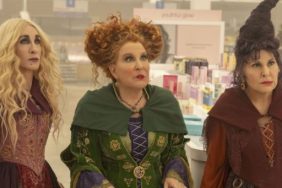We’ve done the best Batman movie ever, and we’ve done the best Superman movie ever, and now it’s time to talk about the best justice movie ever, because movies about “dawn” are pretty rare unless you count Welcome to the Dollhouse.
Not that it’s ever a bad time to talk about the concept of justice, of course. The notion that human beings must be held to a reasonable standard of behavior is the very foundation of our society. Good deeds must be celebrated and bad deeds must have consequences if humanity wants to avoid devouring itself. Many stories have an underlying theme of justice in one form or another, so picking just one film to stand out as the medium’s best examination of the theme is going to be damn near impossible for our stable of critics: Crave’s William Bibbiani and Witney Seibold, and Collider’s Brian Formo.
But once again, they have risen to the challenge. Find out which film each of our critics picked, let us know your favorites, and come back next Wednesday for an all-new, highly debatable installment of The Best Movie Ever!
Brian Formo’s Pick: Los Olvidados (1950)

Koch-Lorber
Luis Buñuel had ruffled so many feathers—with his anti-Catholic imagery in early Spanish films, his anti-Francisco Franco stance made him leave Spain, and whispers of his Communist sympathy made him step down from a museum position in the States—by 1950 he simply set out to make a film that ached for children. Even for that he was labeled “evil” by the Mexican press. The film in question was Los Olvidados. What Buñuel set out to do was direct an “attack on the sadness that ruins children before they have a chance.”
The reason why the national press called Los Olvidados “evil” is because the country had already turned a blind eye to the dire straits of many of its citizens, and Buñuel was showing it to the rest of the world. Poverty pushes people to edges of society where the powers that be can treat them with an out-of-sight, out-of-mind approach. And if sight is removed long enough, hopelessness will breed, and children have an even harder route to be seen, heard, taught, and respected.
Olvidados concerns street kids, many of whom witness and commit crimes. Many of the kids bathe in milk or steal milk from goats, for nourishment and health, yes, but in the hands of Buñuel, also because they miss the warmth that a mother should provide. Despite being a great film full of impressive imagery, what makes Olvidados a great film about justice? Buñuel has no solutions, he uses film as a medium to ask the world at large to not turn a blind eye on the children of the world. And because Mexico was so mortified by what Buñuel presented at the biggest film festival in the world, Olvidados spurned government—which attempted to make Buñuel attach a happy ending to show that Mexico was literate and progressive—create a few provisional nets to actually try and keep their poorest children literate and progressive.
Witney Seibold’s Pick: 12 Angry Men (1957)

United Artists
The sixth amendment to the Constitution reads thus: “In all criminal prosecutions, the accused shall enjoy the right to a speedy and public trial, by an impartial jury of the State and district wherein the crime shall have been committed, which district shall have been previously ascertained by law, and to be informed of the nature and cause of the accusation; to be confronted with the witnesses against him; to have compulsory process for obtaining witnesses in his favor, and to have the Assistance of Counsel for his defence.”
Although the American criminal justice system is hardly unimpeachable, the above contract at least guarantees that we’re to be judged by, ostensibly, people just like us. We may hate attending jury duty, but we should perhaps recognize that we are taking place in one of the more important and exciting pieces of civic pride that we can as citizens. This right is no better dramatized than in Sidney Lumet’s 1957 classic 12 Angry Men, a film about taking it out.
12 Angry Men takes place in a hot room on a long day with a dozen completely impatient, sweaty white guys who just want to go home. They are there to decide the verdict in a murder trial. It seems like an open-and-shut case; a witness saw a young man stabbing his father, another witness saw him fleeing the scene, someone else found the murder weapon. It’s all on the page. Eleven of the twelve men decide the verdict right away. The twelfth (Henry Fonda), has a nagging doubt. A reasonable doubt. He sets out to explain that this case isn’t so cut-and-dry, and all you need is to look at the facts carefully.
These are not lawyers or experts. These are ordinary guys. They are meant to be anyone. Lumet’s film is not just a masterpiece of conversation, pacing, and atmosphere (you can really feel your shirt sticking to your back), but stands as an important symbol for the criminal justice system working at its best. A jury of peers doesn’t need to be expert, but they should take the time to talk. We should take the time to talk. It’s our right as Americans.
William Bibbiani’s Pick: The Verdict (1980)

20th Century Fox
“Justice” is a complex concept, one that depends on societal expectations and individual standards. It could be argued that practically any movie – from Abraxas to Zardoz – is about some sort of “justice.” But legal movies are more transparent about the theme than most, and so I gravitate towards one of the best this week. The best movie about justice is The Verdict, a film that asks big questions and reduces them to an understandable scale.
Paul Newman, giving one of his best performances (which is to say, it is one of the best performances period), plays Frank Galvin, a has-been lawyer who takes on an easy case. It’s a medical malpractice suit that is guaranteed to settle out of court for a large amount of cash. Even the victim’s family is happy to take the check. But Frank, to his own surprise, can’t let the defendant off easy. Dropping table scraps to the aggrieved won’t cut it this time. Frank insists on trying the case, even though he hasn’t won a case in years.
Sometimes doing the right thing is easy. When it’s hard, even the most principled among us can be tempted to compromise. The Verdict is a riveting drama about pushing back against pragmatism, about prioritizing morality over “common” sense. What’s astounding about Sidney Lumet’s film is that it’s a preachy tale that never seems to preach. Lumet was a purveyor of realism, his films unmarred by overstatement or gloss. If The Verdict has an impact on you, it’s not because the filmmaker engaged in crass manipulation, it’s because the story was believable and had genuine weight. And The Verdict will most definitely have an impact. It’s one of the best movies ever.
Previously on The Best Movie Ever:
Top Photo: Koch-Lorber / 20th Century Fox / United Artists
The Best Movie Ever
-
The Best Movie Ever | Under the Sea

Is the best movie ever set underwater a family film about a fish or a World War II movie about a German submarine?
Photos: Disney / Pixar / Neue Constantin Film
-
The Best Movie Ever | Video Game Adaptations

There aren't a lot of good video game adaptations, and our critics just can't agree on which one is the best.
Photos: Universal Pictures / New Line Cinema / Dimension Films
-
The Best Movie Ever | Reptiles

Movies about slithery things aren't very common, so our critics are presenting their picks for the best reptile movies ever.
Photo: Warner Bros. / Paramount Pictures / New Line Cinema
-
The Best Movie Ever | Helena Bonham Carter

Is Helena Bonham Carter's best movie a classy costume drama or a twisted critique of contemporary masculinity?
Photo: Fine Line Features / Miramax Films / 20th Century Fox
-
The Best Movie Ever | Crime Comedies

What's the best comedy ever made about living a life of crime? Our critics present their picks.
Photo: MGM / Warner Bros. / Janus Films
-
The Best Movie Ever | Jodie Foster

The Oscar-winning actor/director is one of the most respected artists in the film industry. But what's her best movie ever?
Photo: Columbia Pictures / Warner Bros. / MGM Home Entertainment
-
The Best Movie Ever | Robert Downey Jr.

The man who would be Iron Man has had one of the most unusual careers in film history, but which movie is his best?
Photo: Warner Bros. Pictures / Paramount Pictures
-
The Best Movie Ever | Cats

Keanu may be a great comedy about a cat, but what's the best cat movie ever? Our critics picked some WEIRD films this week!
Photo: Drafthouse Films / United Artists / Kindai Eiga Kyokai
-
The Best Movie Ever | Charlize Theron

Is Charlize Theron's best movie the one that earned her an Oscar, or the one that kicked ass?
Photo: Warner Bros. / Newmarket Films
-
The Best Movie Ever | Ice Cube

It's been 25 years since Ice Cube made his acting debut. So what's his best movie ever?
Photo: Miramax Films / New Line Cinema / Universal Pictures
-
The Best Movie Ever | Dreams

What's the best movie ever made about dreams, dreaming or dreaminess? Our critics present their picks.
Photo: Films du Losange / Criterion / Fox Searchlight
-
The Best Movie Ever | Batman

Everybody loves Batman, but what's the best Batman movie ever? Our critics can't agree in this week's roundup.
Photo: 20th Century Fox / Warner Bros.
-
The Best Movie Ever | Superman

Batman v Superman isn't the best Superman movie ever, so we asked our stable of critics to decide which one is.
Photo: Warner Bros.
-
The Best Movie Ever | Justice

Let's celebrate this exciting new Dawn of Justice with a spirited debate about the best movie ever made about justice itself.
Photo: Koch-Lorber / 20th Century Fox / United Artists
-
The Best Movie Ever | John Goodman

The star of 10 Cloverfield Lane has had an astounding career, but what's his best movie ever?
Photo: Gramercy Pictures / 20th Century Fox
-
The Best Movie Ever | Die Hard Ripoffs

Die Hard spawned a whole genre of action movies that live on to this day, but which Die Hard ripoff is the best?
Photo: 20th Century Fox / Columbia Pictures / Golden Princess Film Production
-
The Best Movie Ever | Oscar Bait

'Oscar bait' isn't an insult, it's a genre. So what's the best Oscar bait movie ever?
Photo: The Weinstein Company / Universal Pictures
-
The Best Movie Ever | Witchcraft

What's the most bewitching movie ever made about witches? Our panel of critics narrows it down to two classic films.
Photo: Criterion / American International
-
The Best Movie Ever | Action Comedies

If Deadpool isn't the best action comedy ever, what is? Our panel of film critics make the case for their favorites.
Top Photo: Warner Bros. / RM Films International / 20th Century Fox
-
The Best Movie Ever | George Clooney

Everyone loves George Clooney, but none of our critics can agree on which film qualifies as his very best.
Photo: Buena Vista / Universal / Warner Bros.
-
The Best Movie Ever | Martial Arts

Our panel of critics fights over their picks for the best martial arts movie ever made. There can be only one!
Top Photo: Shaw Bros. / Warner Bros. / Toho
-
The Best Movie Ever | Creepy Dolls

Everyone's frightened of little toy people, but what's the creepiest creepy doll movie ever?
Top Photo: Universal Pictures / United Artists / New World Pictures
-
The Best Movie Ever | Modern Warfare

If 13 Hours isn't the best movie about our contemporary wars, what is? Our panel of critics weighs in.
Photo: Warner Bros./Columbia Pictures/Summit Entertainment
-
The Best Movie Ever | Revenge

If The Revenant isn't the greatest revenge movie, what is? Our film critics nominate some of the best films ever made.
Top Photos: Janus Films / Paramount Pictures / Tartan Films
-
The Best Movie Ever | Parties

We asked our critics to pick the best party movie ever made, and none of them picked a film about a frat house.
Photo: Warner Bros. / 20th Century Fox / Sony Pictures Classics
-
The Best Movie Ever | Quentin Tarantino

Is the Hateful Eight director's best film an autumnal romance or a World War II drama? Our critics can't decide.
Photos: The Weinstein Company / Miramax
-
The Best Movie Ever | Star Wars

Is A New Hope better than The Empire Strikes Back? Our critics debate the classics (and ignore the rest).
Photos: Disney / LucasFilm
-
The Best Movie Ever | Ron Howard

He's directed films in nearly every genre and won an Oscar for his troubles, but what's the best Ron Howard movie ever?
Photo: Touchstone / Universal / MGM
-
The Best Movie Ever | William Shakespeare

He's the most adapted author in movie history, but which William Shakespeare movie is the very best?
Photo: Top Photos: Toho / Paramount / Columbia
-
The Best Movie Ever | Pixar

Everyone has their favorite Pixar movie, but which one is the best?
Photo: Disney
-
The Best Movie Ever | Young Adult

Before you say goodbye to The Hunger Games, find out what our critics think was the best young adult movie ever.
Photo: Universal Pictures / Warner Bros.
-
The Best Movie Ever | Angelina Jolie

She's been acting for decades, directing for years, and winning our admiration forever. But what is Angelina Jolie's best film ever?
Photo: The Samuel Goldwyn Company / HBO / Columbia Pictures
-
The Best Movie Ever | James Bond

It's new school versus old school! Our critics debate which film qualifies as the best Bond movie ever.
Photo: MGM / Colombia Pictures / United Artists
-
The Best Movie Ever | Sandra Bullock

Our critics can only agree on one thing: the best Sandra Bullock movie isn't the one that got her an Oscar.
Photo: 20th Century Fox / Warner Bros.








